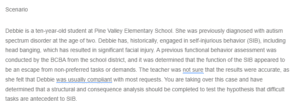Structural and Consequence Analysis
Structural Analysis
Procedures used in structural analysis directly examine the causal connection between antecedent variables and interfering behaviors (Steege et al., 2019). As a behavior analyst, I would perform a structural analysis by methodically changing the antecedent circumstances to see how they affect Debbie’s self-injurious behavior (SIB). A systematic study of antecedent conditions, precisely task difficulty, is essential in understanding the relationship between challenging tasks and the occurrence of self-injurious behavior (SIB) in individuals (Adithyan Rajaraman & Jessel, 2023). I would start by listing various requests or chores that varied in difficulty, some of which would be simple for Debbie and others tougher. Then, after carefully monitoring Debbie’s conduct, I would implement a systematic examination in which I would give Debbie each of these activities one at a time. During each task presentation, I would gather information on whether SIB occurred and the severity of the behavior. I would also mention her compliance level because it’s crucial to determine whether there is a connection between task difficulty and non-compliance, which could result in SIB.
Consequence Analysis
Conducting a consequence analysis involving systematically varied consequences after self-injurious behavior (SIB) is crucial for identifying the reinforcing elements contributing to maintaining this behavior in individuals (Khokhar, 2023). I would implement several regulated consequence conditions in particular. For instance, in one scenario, I might take a quick break from non-preferred tasks right when SIB occurs, whereas, in another system, I might carry on with the work as usual. In addition, I would set up two conditions: one where Debbie receives positive attention following SIB and the other where concentration is minimized. During each punishment condition, I would attentively monitor and note any changes in her task compliance and the frequency and intensity of SIB. By systematically varying the consequences following SIB, I can determine if escape from tasks or attention plays a significant role in maintaining this behavior, helping to refine the understanding of the function of SIB and informing the development of effective behaviour interventions.
References
Adithyan Rajaraman, & Jessel, J. (2023). Self-Injurious Behavior. Springer EBooks, 1181–1197. https://doi.org/10.1007/978-3-031-19964-6_61
Khokhar, N. (2023). Research Patterns in the Treatment of Adults with Problem Behaviour and Intellectual and Developmental Disabilities: A Quantitative Systematic Review. Dr.library.brocku.ca. https://dr.library.brocku.ca/handle/10464/17782
Steege, M. W., Pratt, J. L., Garry Wickerd, Richard Guare, & Watson, T. S. (2019). Conducting school-based functional behavioral assessments: A practitioner (3rd ed.). GUILFORD.
ORDER A PLAGIARISM-FREE PAPER HERE
We’ll write everything from scratch
Question 
DB U.5.410
Scenario
Debbie is a ten-year-old student at Pine Valley Elementary School. She was previously diagnosed with autism spectrum disorder at the age of two. Debbie has, historically, engaged in self-injurious behavior (SIB), including head banging, which has resulted in significant facial injury. A previous functional behavior assessment was conducted by the BCBA from the school district, and it was determined that the function of the SIB appeared to be an escape from non-preferred tasks or demands. The teacher was not sure that the results were accurate, as she felt that Debbie was usually compliant with most requests. You are taking over this case and have determined that a structural and consequence analysis should be completed to test the hypothesis that difficult tasks are antecedent to SIB.

Structural and Consequence Analysis
Discussion
Please complete your assigned readings, then choose your role and respond to the following:
According to the examples in the text, how would you conduct a structural analysis for this scenario? Be sure to discuss specific antecedent conditions that could be presented and how you would collect data.
According to the examples in the text, how would you conduct a consequence analysis for this scenario? Be sure to discuss specific consequence conditions that could be presented and how you would collect data.